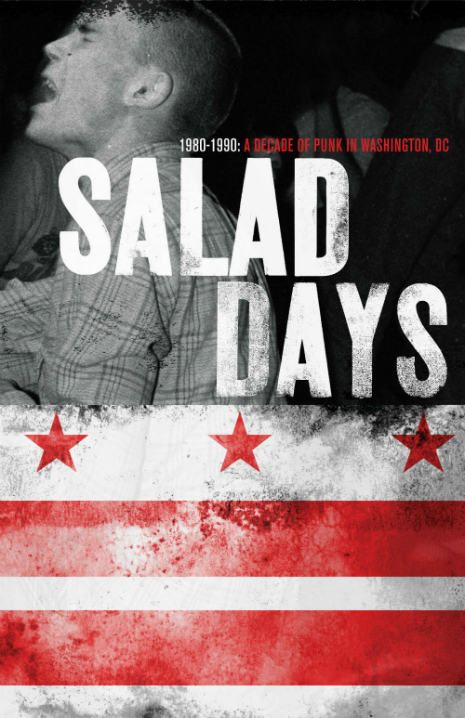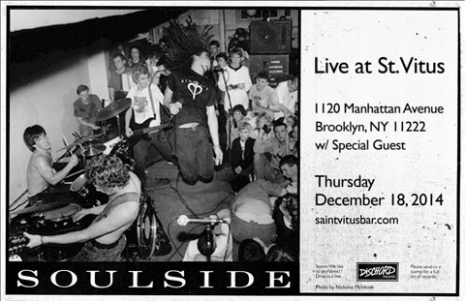During the ten-year timespan that encapsulated the Reagan presidency and the emergence of Washington, D.C. as the nation’s murder capital, the1980s DC punk underground became a hotbed of incendiary youth activism. The 1980s saw the birth of Dischord Records and DC bands like Minor Threat, Beefeater, Fire Party, Soulside, Rites of Spring, and Fugazi as the harDCore scene matured around community action groups like Positive Force that advocated for punk rock to take direct action against societal injustice.
The early scene was not without its critics, and was sometimes derided by music reviewers like Robert Christgau who, according to Positive Force founder, Mark Anderson, in his seminal history of DC punk, Dance of Days, once called the emerging aggressive breed of young punks “muscleheads.” As a counterpoint, according to Anderson, the comment lead to the title of Flex Your Head, a compilation of DC punk released on Dischord Records in 1982.
The DC underground’s fiercely D.I.Y and, often, cerebral take on traditional punk rock continues to resonate.
A new documentary about the era called Salad Days: The DC Punk Revolution, is set to make its debut in a few weeks. Created by Director Scott Crawford, a then very youthful fanzine chronicler of the 1980’s DC punk scene and Jim Saah (Director of Photography and Editor), a now professional photographer who taught himself the art in large part by shooting DC punk performances, the Kickstarter-funded film will begin seeing the light of day in November after being in the works for nearly four years. Salad Days features interviews with DC punk and post-punk luminaries Ian MacKaye, J. Robbins, Brian Baker, Kenny Inouye, Dante Ferrando and many others. DC post-punk outfit Soulside, three members of which went on to form Girls Against Boys, will reunite for a handful of shows in conjunction with the NYC and DC premiers.
I sent both Crawford and Saah a few questions via email recently and asked them to discuss the upcoming release of the film, their backgrounds as young fanzine creators, and what the 1980s DC hardcore scene meant to them.
DM: Scott, tell me about your years of making underground publications and what drew you to the Salad Days project.
Crawford: My love of magazines started as a kid when I published a fanzine called Metrozine that was focused on the DC punk scene. I did that for almost three years until I started playing in a band. Years later, I started two other zines that focused on the indie rock world at the time and I worked with some amazing writers and photographers (including Jim Saah). In 2001, I started another consumer music magazine out of my basement called HARP that was eventually bought by another publishing company. I worked as the Editor and Creative Director for seven years—and the focus was independent music and culture. Unfortunately once the economy bottomed out, so did the magazine industry and we were a casualty.
I’d been wanting to document the DC punk scene in the 1980s somehow and just thought a documentary film was the best way to tell the story. Speaking with a lot of the people that I’d spoken to almost 30 years ago (as a fanzine kid) provides a type of perspective that I think offers a unique take on the story. Honestly, after the magazine went under, I was floundering a bit personally and professionally. While the film took almost four years to complete, it’s been therapeutic, humbling and incredibly satisfying.
DM: This music was literally life changing for so many young people, but there have always been haters out there about it from critics to other punks who thought the scene was overly earnest and self-righteous. As you pointed out in your Kickstarter campaign, so much is misunderstood about DC punk in the 80’s. What’s the biggest misunderstanding?
Crawford: The DC punk scene in the 1980s was polarizing. Whether it was straight edge, socio-political issues or “emo”, they all provoke a reaction of some sort—which speaks volumes for the impact that this city has had not just on independent music but the culture at large. My eight-year-old daughter has never heard an Embrace song, but she uses the word “emo” on a daily basis. But as the film explores, not everyone was straight edge, humorless and pious. It was a diverse community and while it had its share of disfunction, it was made up of incredibly creative, hard-working people that created a thriving music scene at a time when there was no real local radio support or music industry infrastructure to help support it. That’s no small feat.
In this clip from Salad Days, Ian MacKaye talks about still addressing the straight edge issue.
DM: Talk about the Soulside reunion shows that are coming up in conjunction with the film’s release.
Crawford: I’d been talking to the band for a while about doing a reunion show when the film was ready to come out. They haven’t played on a stage in over 25 years so I really wasn’t sure if it’d actually come together, but I think the timing just worked for them. Personally speaking, they were always a favorite of mine, so it’s particularly meaningful to have them onboard. It’s going to be a really special weekend.
DM: Is there still a movement mentality in the D.C. underground?
Crawford: I think that’s part of the DNA of folks living in DC and active in the underground music community. I think having organizations like Positive Force in the city helps keep the activism alive.
DM: Jim, How long have you known Scott Crawford and how have you guys worked together over the years? How’d you get involved in the Salad Days film?
Saah: I’ve known Scott since he was twelve years old. He called me and asked if he could use my photos in his fanzine. Then later on I would shoot photos for the various music magazines he would do over the years, Noise Works, Bent and Harp. I did fanzines of my own that Scott wrote for as well. In the 80’s I did Zone V which was a photo/fanzine, then in the 90s I did about a dozen issues of Uno Mas, which was more of a culture fanzine. I’ve thought about doing a book from time to time about DC punk rock but not a film. Scott came to me with the idea to make a film. He actually had to talk me into it a bit because I thought it was a daunting task. And it was! But since we have a long friendship and have collaborated on many things over the years it was very easy falling into a good workflow for the film.
DM: You shot everybody from the DC underground in the early 80’s including Faith, Government Issue, Scream, Black Market Baby, Iron Cross, and Minor Threat (including their last show at Landsburgh Center in 1983) to name just a few. How old were you in 1983? Did you feel like these bands were making history?
Saah: I turned eighteen in March of 1983. I didn’t have a sense of history being made at the time, but there was a sense that we found something special, something that spoke to us and wasn’t what everyone else at school was into. It was special. I was incredibly excited by the whole thing. I discovered older punk rock first; NY and British stuff from the late 70’s. But then I quickly found out that people were making incredible punk rock right now in my backyard! So we went to every show and drank it all in. I didn’t start a band but I did start a fanzine and took photos at all the shows and loved the community and camaraderie. It was a beautiful thing to be accepted by like-minded people.
(I asked both Crawford and Saah the following) What’s the underlying message of Salad Days and what do hope for young musicians and artists to take away from it?
Saah: For me the underlying message is that this music scene and community taught me that I can do anything I set my mind to, that I didn’t need anyone’s permission to be a photographer. I just needed to do it. It set me on a path that I’m still on. I took pictures of bands for my fanzine, then for the City Paper then for the Washington Post. The punk ethos taught me to believe in myself, and also taught me how to not settle for what’s put in front of me in regards to art and culture. It taught me that it may take a little work to find a band or book or movie that’s not easily found on the radio or in the library or at the Cineplex at the mall, but people are making incredible, moving and inspiring art that’s off the mainstream radar and it’s extremely rewarding to go find it. I’m still on the hunt to this day. And now my kids turn me on to cool shit that I didn’t know existed.
Crawford: Salad Days isn’t about nostalgia for me. It’s about looking at that period in my life and applying the things I learned then to my life now. In other words, my best days aren’t behind me—they’re ahead of me. Hell, they’re right now.
DM: How can people get their hands (or at least eyes) on the film once it’s released?
Crawford: We’re premiering the film over the November 14, 2014 weekend at DOC NYC Film Festival in NYC, and in the Midwest (the same night) at the Sound Unseen Film Festival in Minneapolis, MN and on Sunday, November 16 at the Olympia Film Festival in Olympia, WA. Then our Washington, DC premier begins on December 19 at the AFI Theater and runs through December 22. After that, we’ll be doing a few more film festivals followed by a theatrical run and DVD/VOD.
Look for updates on the film’s Facebook page and check out the trailer for Salad Days below:
Saturday, November 29, 2014
SALAD DAYS: A TALK WITH THE FORMER FANZINE KIDS BEHIND THE NEW 80S DC PUNK DOCUMENTARY
from Dangerous Minds:
Labels:
documentary,
Punk,
washington DC
Subscribe to:
Post Comments (Atom)




























No comments:
Post a Comment